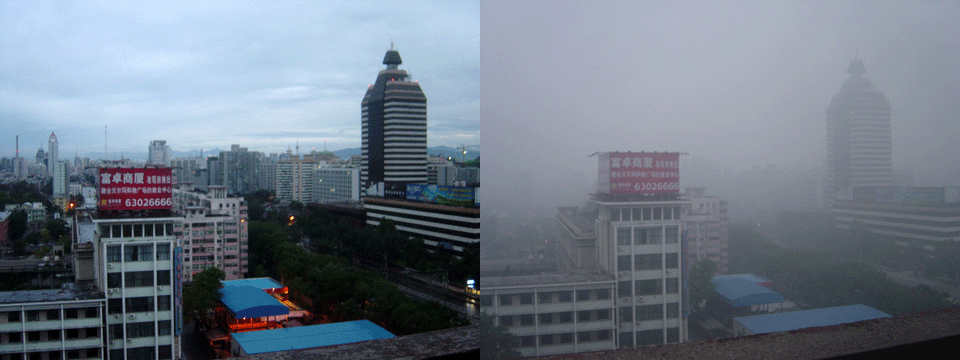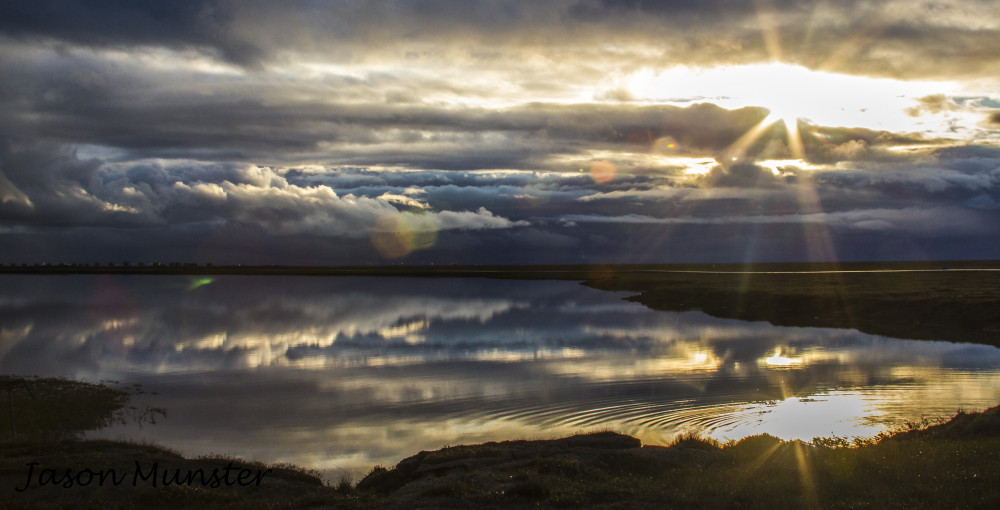Short answer: no. Longer answer: only if it is raining or just rained.
It's been two months since a post. Sorry, been working on a low-cost solution to fix stuff discussed herein, applying for grants, and continuing my PhD. Back on track for one per month after this post, though.
So. Air pollution. It's comprised of four major life-threatening pollutants: PM2.5 (particles 1/30th the diameter of a human hair), SO2, NO2, and ozone. SO2 becomes battery acid in your lungs, so that sucks. NO2 becomes nitric acid, which can strip lead from glass. Ozone is great high up in the sky cause it blocks UV, but on the ground it's toxic and kills plants and hurts humans.
All of these things absorb into rain and then fall to the ground. In other words, a rainstorm scrubs them out. That smell in the air after a rainstorm? Often it's the smell of clean air. It's what air is supposed to smell like. This is why we get acid rain. All that stuff goes into the rain, and that rain can cause pits in statues. Imagine what all that pollution does in your lungs if it can pit statues from being in rain.

The sky in Beijing after rain (right) is cleared of pollutants. Rain removes most pollution.
The rest of the time, if there is pollution, here is what happens:
Exercise involves breathing more than not exercising. You breathe more, you breathe deeper. Deeper into your lungs. So if you exercise, you are exposing more of what you breathe deeper into your lungs. Breathe in pollution, mess up your lungs.
Exercise. You live in a developed country? It's likely that every minute of exercise adds more than that amount of time to your life. What about if you are in a polluted area? The jury is still out. Most mortality studies are based on widely available statistics, and are inexpensive. If you want to start studies specific to exercising air pollution, that becomes more expensive. So there is not much data on it.
You breath up to 3x as much volume when you exercise. It penetrates deeply and rapidly into your lungs. Moreover, you are breathing 3x the volume in through the exact same amount of nose, mouth, and lungs that you always have. That means air is moving a lot faster. Many of our defenses, like the mucus that lines our airways, becomes less useful if pollutants are moving so fast past them that it can't be captured. So we breathe faster in exercise, making air move 3x as fast, reducing our ability to filter things.
That's what I like to call a hand-waiving argument. I offer few hard, tested facts. Unfortunately, I can't find solid sources one way or another on this. Most experts, however, indicate that exercising in air pollution is a bad idea. A few doctors disagree, but I've yet to find a pulmonologist (lung doctor) who disagrees. In other words, the actual experts I've talked to all think that exercising during awful pollution is bad.
The Chemistry
Okay, let's get more detailed. Many pollution masks filter PM2.5. I'm skeptical of their sealing ability during exercise (if you don't have a good seal, you breathe in non-filtered air through the leaks, and you aren't filtering anything). Moreover, no one filters SO2 and NO2. So pretty much, go ahead and filter your PM2.5. You're still making battery acid in your lungs. In other words, don't exercise without a gas mask that can filter PM2.5.
Some say to exercise in parks. Why? It turns out that trees and plants can "filter" PM2.5 and other chemicals by pulling them out of the air. This works great if you are in, say, the US or Sweden, two of the cleanest countries in the world. In China, or worse yet in India, this filtration will be overrun rapidly. So pretty much, don't exercise in parks.
How about gyms? In the western world, gyms do a pretty good job of filtering outside air of PM, but they do not filter SO2 and NO2. In the developing world, not so much. They might run their air through ACs, which have filters, but it's unreliable to assume that they spent the tremendous amount extra to get ACs that do filter air pollution. So, still dangerous.
What to do? It depends on where you are. It turns out that pollution in Northern China (represented by a whopping 500 million people living there) is heavily SO2 impregnated in winter, and less so in summer. In other words, don't exercise in winter. Great, right? We all already get fatter in winter. Now we have that pushing us. Pollution in summer is not as bad with the SO2. If you trust vogmask to get a good seal (I don't), then get a mask and run with it. Again, I wouldn't recommend that.
So, in short, wait for low air-pollution days to exercise, and then get it all in at once. Or wear a gas mask. Or wait til I come up with something better. Cause that's coming.
Thanks for reading!
- Jason Munster
